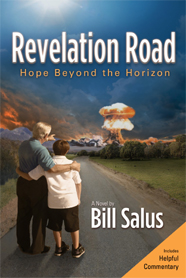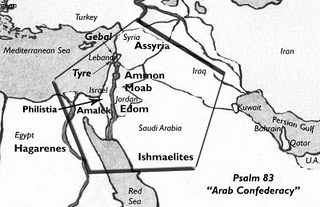Ezekiel 35, the Arab-Israeli War before Ezekiel 38
on Tuesday, January 24, 2012 by Bill SalusMany end times experts believe the “Gog of Magog” invasion described in Ezekiel 38 and 39 is nearing the time of its prophetic fulfillment. Russia’s seemingly inseparable alliance with Iran, Turkey’s increased disdain toward Israel, and Libya’s uncertain future all suggest that the stage is rapidly setting for the fulfillment of the Magog invasion of Israel. All of these countries along with several more appear to be part of the Russian coalition that mounts this massive attack.
Putting the icing on the cake is the fact that Iran’s apocalyptic leadership wants to wipe Israel off the map and is on the verge of producing nuclear weapons. Certainly all the above, coupled with a host of other unmentioned indicators provides just cause to consider that the Ezekiel 38 prophecy could soon occur. But what about the war prophesied in Ezekiel 35? Is it conceivable that the war of Ezekiel 38 could precede the last days Arab – Israeli conflict predicted three chapters earlier?
Putting the icing on the cake is the fact that Iran’s apocalyptic leadership wants to wipe Israel off the map and is on the verge of producing nuclear weapons. Certainly all the above, coupled with a host of other unmentioned indicators provides just cause to consider that the Ezekiel 38 prophecy could soon occur. But what about the war prophesied in Ezekiel 35? Is it conceivable that the war of Ezekiel 38 could precede the last days Arab – Israeli conflict predicted three chapters earlier?
 Below are several excerpts about this Arab – Israeli war that have been borrowed from my recently released book called Revelation Road, Hope Beyond the Horizon. An exhaustive biblical commentary of Ezekiel 35 is provided in the section entitled “The Ezekiel 35 – Psalm 83 Connection.”
Below are several excerpts about this Arab – Israeli war that have been borrowed from my recently released book called Revelation Road, Hope Beyond the Horizon. An exhaustive biblical commentary of Ezekiel 35 is provided in the section entitled “The Ezekiel 35 – Psalm 83 Connection.”
…………..
Ezekiel 34:13, 36:24, 37:12, 38:8, and 39:27-28 all talk about the Jews being re-gathered out from the nations of the world back into the Holy Land of Israel. By the time one reads through Ezekiel 34-39 they are left with the indelible impression that in the last days, the Jews will be re-gathered into Israel. There is absolutely no way to draw any other conclusion!
Therefore, it stands to reason contextually that because Ezekiel 35 is huddled in the midst of the above chapters, it must have some association with the Jews, Israel, and the end times. Pivotally Ezekiel 35:5, which will be displayed below, informs that the Arabs possess an ancient hatred of the Jews that prompts Arabs to shed Jewish blood in the end times. Presuming mankind has been plunged into this final perilous period, a comprehensive study of Ezekiel 35 should underscore the present Arab-Israeli predicament in the Middle East. Below is a verse by verse study of Ezekiel 35.
Moreover the word of the LORD came to me, saying, “Son of man, set your face against Mount Seir and prophesy against it, and say to it, ‘Thus says the Lord GOD: “Behold, O Mount Seir, I am against you; I will stretch out My hand against you, And make you most desolate; I shall lay your cities waste, And you shall be desolate. Then you shall know that I am the LORD. ((Ezekiel 35:1-4, NKJV; emphasis added).
Ezekiel begins with the word “moreover,” which implies a continuation from the previous chapter 34. Ezekiel 34, concluded with an end-times’ depiction of the Jews being re-gathered into Israel, restored as God’s people, and being blessed. From other Scriptures, we recognize that Israel becomes blessed during the messianic kingdom, but before this is re-gathered in a condition of unbelief in preparation for judgment.
Dr. Arnold Fruchtenbaum aptly points this out in his excellent book called The Footsteps of the Messiah. He says “The Bible speaks of two distinct worldwide regatherings (of the Jews). First, there is to be a worldwide regathering in unbelief in preparation for judgment; specifically the judgment of the Tribulation. That is to be followed by a second worldwide regathering in faith in preparation for blessing, specifically, the blessing of the Messianic Kingdom.” [i]
Presuming his assessment is correct we are to recognize that the re-gathering of Jews into Israel occurs over time, and involves a two-step process. The inference from Ezekiel 35:1-4 is that at some point during the two-step restoration process of the nation Israel, Mount Seir does something to aggravate the Lord. Four times the prophet uses the word against, evidencing the Lord is provoked to anger to act against Mount Seir. Two times he uses the word desolate. Far beyond a divine disciplinary hand-slap, Mount Seir will experience desolation. The severity of punishment points out the seriousness of Mount Seir’s crime.
Mount Seir finds a definite historical connection with Esau and his Edomite descendants. However, as this article will later point out, it also represents more Arabs than just the Edomites. Who exactly is the Mount Seir of Ezekiel 35? What are they guilty of? Lastly, at what point in the two-step regathering process does Mount Seir experience desolation?
Because you have had an ancient hatred, and have shed the blood of the children of Israel by the power of the sword at the time of their calamity, when their iniquity came to an end. (Ezekiel 35:5, NKJV).
Fortunately, we don’t have to look farther than verse five to find out what Mount Seir is guilty of. Because of their historical hatred of the Jews, the Arabs spitefully shed Jewish blood. The spilt blood angers the Lord; not just any blood, but Jewish blood. Furthermore, Ezekiel declares the power of the sword is used to shed this blood. This means the Arabs’ war against Israel. This passage also identifies the timing of the Arab war. It occurs during the calamitous end times.
Regarding the calamitous end times, the American Standard Version (ASV) translates Ezekiel 35:5 more succinctly as an end times event. The ASV reads as follows: “Because thou hast had a perpetual enmity, and hast given over the children of Israel to the power of the sword in the time of their calamity, in the time of the iniquity of the end;”
Therefore, as I live,” says the Lord GOD, “I will prepare you for blood, and blood shall pursue you; [Arabs] since you have not hated [shedding Jewish] blood, therefore blood shall pursue you.” (Ezekiel 35:6, NKJV).
Arab blood for Jewish blood is the remedial requirement determined by the Lord. This is the curse-for-curse-in-kind specification in Genesis 12:3. The Arabs severely curse Israel, and in turn will be similarly severely cursed. The Lord preferred the Arabs would have abandoned their ancient hatred of the Jews. The inhumane treatment of the Jews by the Nazis during the Holocaust should have prompted empathy from the Arabs, but verse six informs they still hated the Jewish bloodline.
Thus I will make Mount Seir most desolate, and cut off from it the one who leaves and the one who returns. And I will fill its mountains with the slain; on your hills and in your valleys and in all your ravines those who are slain by the sword shall fall. I will make you perpetually desolate, and your cities shall be uninhabited; then you shall know that I am the LORD. (Ezekiel 35:7-9, NKJV; emphasis added).
Again Ezekiel repeats the sentiment of verse three: Mount Seir will be most desolate. The mountains, hills, valleys, and ravines will be filled with the slain and the cities will be abandoned. In the aftermath, the Arabs will realize that the Lord had His hand in the massive slayings. Ezekiel 35:3 declares the outstretched hand of the Lord causes the desolation, but here in verse eight we discover the Lord’s weapon of choice is the sword.
Ezekiel 25:14 may hold an important clue as to how the sword in the Lord’s outstretched hand represents the IDF executing judgment upon Edom:
“I will lay My vengeance on Edom by the hand of My people Israel [IDF] that they may do in Edom [Mount Seir] according to My anger and according to My fury; and they shall know My vengeance,” says the Lord GOD. (Ezekiel 25:14, NKJV).
This passage finds definite association with a military judgment upon the Edomites, who hailed from ancient Mount Seir. Esau’s Edomite descendants will be forced to recognize the Lord’s hand of judgment when the IDF takes vengeance against them. It is important to note that the Edomites are listed first within the Psalm 83 Arab confederacy, as the “tents of Edom.” In my book called Isralestine, in the chapter called Whodomites, Who are the Edomites Today, I carefully connect the Palestinian refugees, through several historical waves of migration, with the tents of Edom. Today the Edomites have ethnic representation within the Palestinians.
It is additionally important to note that the massive slaying of Edomites described in Ezekiel 35:7-9 by the IDF has not occurred yet. After Ezekiel wrote, many Edomites were slaughtered by the Seleucid king Antigonus around 312 BC. However, this episode did not involve the IDF at the time, disqualifying it as a fulfillment of Ezekiel 25:14.
Subsequently, around 126 BC, the Jewish high priest John Hyrcanus fought and killed many Edomites. But, his IDF victory did not fill the mountains, hills, valleys, and ravines with the slain and cause the abandonment of the cities. To the contrary, Hyrcanus allowed the surviving Edomites, who were called Idumeans at the time, to remain and repopulate within their cities as long as they converted to Israel’s religion of Judaism. In addition, neither of the Antigonus or Hyrcanus victories occurred in the end time’s fulfillment of Ezekiel 35:5.
“‘Because you have said, “These two nations and these two countries shall be mine, and we will possess them,” although the LORD was there, therefore, as I live,’ says the Lord GOD, ‘I will do according to your anger and according to the envy which you showed in your hatred against them; and I will make Myself known among them when I judge you. Then you shall know that I am the LORD. I have heard all your blasphemies which you have spoken against the mountains of Israel, saying, “They are desolate; they are given to us to consume.” Thus with your mouth you have boasted against Me and multiplied your words against Me; I have heard them.’” (Ezekiel 35:10-13, NKJV).
Ezekiel uses the word because three times in this chapter, and verse ten begins with the second usage. The first because dealt with the ancient hatred in verse five and the second now addresses the Arab motive. The Arabs seek to possess two nations and two countries. Because the Arabs harbor an ancient hatred, they shed Jewish blood. The reason they shed this blood is to destroy the Israelis and possess Israel.
Ezekiel 35:10 says, These two nations and these two countries shall be mine, and we will possess them. At the time Ezekiel wrote, approximately 2,600 years ago, Israel was a divided country. There was the northern kingdom, commonly referred to as Israel or Samaria, and a southern kingdom, called Judah. Prior to Ezekiel’s time, in 722 BC, the northern kingdom was conquered by the Assyrians, and subsequently in 586 BC, the Babylonians conquered Judah.
The Hebrew word for nations is goy, and for countries is erets. Goy identifies Gentiles, nations, or peoples; whereas erets deals more specifically with the earth and its lands, territories, or regions. Ezekiel is probably declaring the Arabs seek sovereignty over the Jewish people and their previously divided lands.
Being omniscient and omnipresent, the Lord possesses the unique “fly on the wall” advantage of sitting in on all confidential Arab meetings, past, present, and future. Ezekiel summarizes the Anti-Semitic gist of these meetings for us by revealing the Arabs declare blasphemies against the mountains of Israel. Ezekiel notates the Arabs are angry, envious, hateful, and boastful people in their hatred of the Jews and their God Jehovah. They believe Israel’s desolation evidences Israel’s God is weak, and the land (mountains) of Israel belongs to the Arabs.
Below are some specific Arab quotes taken from the Bible, regarded with destroying the Jews and possessing the land of Israel;
• “Because you have said, ‘These two nations and these two countries shall be mine, and we will possess them.’” (Ezekiel 35:10).
• “They [mountains of Israel] are desolate; they are given to us to consume.” (Ezekiel 35:12).
• “Aha! The ancient heights have become our possession!” (Ezekiel 36:2).
• “Come, and let us cut them off from being a nation, that the name of Israel may be remembered no more.” (Psalm 83:4).
• “Let us take for ourselves the pastures of God for a possession.” (Psalm 83:12).
Jordan, identified by the Psalm 83 members of Moab and Ammon, has also made troubling comments along these lines. Zephaniah 2:8 informs us of the following;
I [the Lord] have heard the reproach of Moab, and the insults of the people of Ammon, with which they have reproached My people, and made arrogant threats against their borders.
This disposition of Arab hatred and desire to dispossess Israel of their land was prophesied in Psalm 83. The Psalm warns that the Arabs will confederate, form a crafty plan, and attack Israel. Their mandate is to destroy the Jews and erase the name of Israel forever. Psalm 83:12 informs us the goal of the confederacy is possession of the land of Israel. They don’t want a two-state solution, wherein Jews and Arabs co-exist side-by-side in peace; rather, they want one more Arab State of Palestine. Since Ezekiel 35:5 suggests the Arab war occurs in the calamitous end times, it appears that it could occur in the near future.
“Thus says the Lord GOD: ‘The whole earth will rejoice when I make you desolate. As you rejoiced because the inheritance of the house of Israel was desolate, so I will do to you; you shall be desolate, O Mount Seir, as well as all of Edom—all of it! Then they shall know that I am the LORD.’” (Ezekiel 35:14-15, NKJV).
These verses, like Ezekiel 35:6 above, come out of the Genesis 12:3 foreign policy. The Arabs rejoiced when the Jews dwelt outside of their homeland in the Diaspora and Israel lay desolate. In turn, mankind will rejoice at the conclusion of the Arab – Israeli conflict.
Who is Ezekiel 35 Identifying as Mount Seir?
 Ezekiel 35:15 says “O Mount Seir, as well as all of Edom,” and then repeats, “all of it,” alluding to the entirety of Edom. This implies that Mount Seir represents more than Edom; something in addition to Edom. Ezekiel 36:1- 5 identifies Mount Seir as the surrounding nations encircling Israel including “all Edom.”
Ezekiel 35:15 says “O Mount Seir, as well as all of Edom,” and then repeats, “all of it,” alluding to the entirety of Edom. This implies that Mount Seir represents more than Edom; something in addition to Edom. Ezekiel 36:1- 5 identifies Mount Seir as the surrounding nations encircling Israel including “all Edom.”‘Thus says the Lord GOD: “Because the enemy [Mount Seir] has said of you, ‘Aha! The ancient heights have become our possession,’”’ “therefore prophesy, and say, ‘Thus says the Lord GOD: “Because they made you desolate and swallowed you up on every side, so that you became the possession of the rest of the nations, and you are taken up by the lips of talkers and slandered by the people”—‘therefore, O mountains of Israel, hear the word of the Lord GOD! Thus says the Lord GOD to the mountains, the hills, the rivers, the valleys, the desolate wastes, and the cities that have been forsaken, which became plunder and mockery to the rest of the nations all around—‘therefore thus says the Lord GOD: “Surely I have spoken in My burning jealousy against the rest of the nations and against all Edom, who gave My land to themselves as a possession, with wholehearted joy and spiteful minds, in order to plunder its open country.”’ (Ezekiel 36:2-5; NKJV emphasis added).
Ezekiel specifies, the rest of the nations all around with all Edom, are the slanderous people that seek to make Israel desolate and possess it. The people all around Israel comprise the “inner circle” of Arab states and terrorist populations listed in Psalm 83:6-8. The “inner circle” is a phrase coined in Isralestine to identify the Psalm 83 nations in contrast to the “outer ring,” to identify the Ezekiel 38:1-5 Gog of Magog invaders.
The territories located inside the pentagon of the Psalm 83 image represents the rest of the [Mount Seir] nations all around with all Edom. Mount Seir seems to be the representative term for the Arab confederacy of Psalm 83. Although there was a literal Mount Seir that was home to the Edomites, the use of mount, or mountains, in Scripture can also identify rulers, governments, or hierarchies.[ii]
Conclusion
It appears as though Ezekiel 35 finds direct correlation with the war prophesied in Psalm 83. If so, Ezekiel 35 identifies the Arab countries that surround Israel today. They do not appear to be the same countries identified in the coalition described in Ezekiel 38. Therefore, Ezekiel seems to be describing two distinctly different end times wars. The fact that Ezekiel’s chapters 34-39 appear to read chronologically, suggests that the Arab war of Ezekiel 35 precedes the Gog of Magog invasion of Ezekiel 38 and 39.
hierarchies: Daniel 2:35, 45, Micah 4:7, Zechariah 4:7, Revelation 17:9-10.


